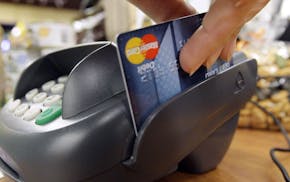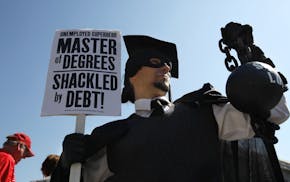One measure of a company is how it faces up to the kind of disruptive change that, left unchecked, could lead to its ruin.
Both Rochester, N.Y.-based Eastman Kodak Co. and Shoreview-based Deluxe Corp. confronted this prospect in the 1990s.
For Kodak, the emergence of digital photography threatened to gut its lucrative film business.
For Deluxe, a printer of checks, it was the advent of electronic payments.
The fact that both companies had managed to survive so long was itself noteworthy. The average lifespan for a Fortune 500 company is about 40 or 50 years. Kodak had been founded in 1889; Deluxe in 1915.
But longevity didn't count for much of anything as management at both companies grappled with how to respond to rapid technological shifts.
They could hedge their bets and hope for the best, or they could begin making painful choices that, in the end, still might not save the company from extinction.
Kodak chose the easier course, and late last month it filed for bankruptcy.
Deluxe, meanwhile, last week reported its second consecutive year of revenue growth, the first time that has occurred since 2005.
Kodak's failure is a fresh reminder of how quickly the fortunes of a business can change. As recently as 1997, shares of Kodak traded for almost $100.
It's been all downhill since then, however, and the bankruptcy filing late last month triggered a wave of nostalgia and almost universal derision. Kodak's senior executives have been mocked for being insular and slow to act, and then for acting stupidly.
That's oversimplifying things. Kodak literally invented digital photography and at one time was the largest producer of digital cameras. Its early forays into affordable printers won raves from consumers.
But Kodak was initially reluctant to outsource manufacturing of those devices. As a result, it lost moneymaking devices that did not replace demand for film.
That's one reason, maybe the main one, that Kodak stuck by the film business so long. Giving up on it would mean saying goodbye to hundreds of millions of dollars that could be invested in the next big thing. And that would entail having to shed tens of thousands of jobs and reconciling itself to being a much smaller business.
By the time Kodak management caved in to reality -- it has closed 13 manufacturing plants and 130 processing labs and slashed 47,000 jobs since 2003 -- it was too late.
Like Kodak, Deluxe is not the company it was two decades ago. It has closed more than 40 printing facilities since the 1990s, and shed 15,000 jobs since 1996. Even so, its stock price has gone nowhere but down during the last decade.
Still, the Deluxe of today has a clear sense of where it wants to go in the coming years and what it needs to do to get there.
Not that there haven't been strategic misfires along the way. Like everyone else, Deluxe caught dot-com fever in the late 1990s and launched a consumer e-commerce site, PlaidMoon, to sell personalized gifts. It flopped and was shut down.
More troubling and costly for shareholders was the decision to spin off its electronics payment processing business as a new company, eFunds Corp. Deluxe reaped about $75 million from the initial stock offering, but six years later eFunds was sold for $1.8 billion.
The executives who made that decision are long gone. Meanwhile, Deluxe is focused on transforming itself from a printer to a company focused on serving small businesses. That strategy emerged in 2004, with the acquisition of New England Business Services, but it has accelerated under CEO Lee Schram, who joined Deluxe in 2006.
In addition to printing checks and business forms, in recent years Deluxe has bought companies that provide Web hosting services, logo design, and search engine marketing capabilities for small businesses.
"Under Lee, what we do for that small-business customer base has really changed and expanded," said Chief Financial Officer Terry Peterson.
Checks remain a vital part of Deluxe's business. In 2010, the company paid $98 million for Custom Direct, a business that provides custom-designed checks directly to consumers. Revenue from check printing, spread across its three business units, still accounts for about 61 percent of Deluxe's $1.4 billion in revenue, but the company's goal is to reduce that to less than half in the next three to five years.
The Deluxe of old may be gone, but the odds of Deluxe being able to celebrate its 100th anniversary are much improved.
ericw@startribune.com • 612-673-1736

Wieffering: Time to get over debit card fees
For Thrivent and others, warnings were there

With billions in sales, some co-ops are big business

